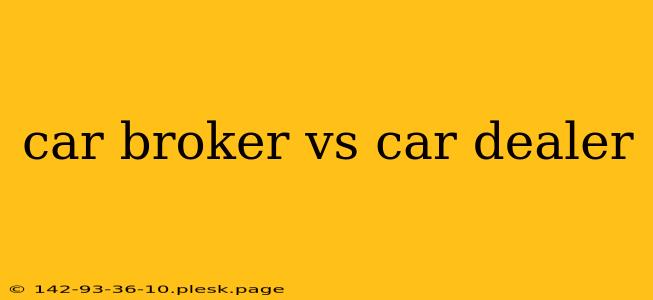Buying a car can be a stressful experience. Navigating dealerships, negotiating prices, and understanding financing options can feel overwhelming. To simplify the process, many buyers are turning to car brokers as an alternative to traditional dealerships. But what's the difference? And which option is best for you? Let's break down the key distinctions between car brokers and car dealers.
Understanding the Roles: Car Broker vs. Car Dealer
The core difference lies in their business models:
Car Dealers:
- Inventory: Dealerships own and maintain a large inventory of vehicles on their lots. They purchase these cars from manufacturers and sell them directly to consumers.
- Negotiation: Negotiating the price is a key part of the car-buying experience at a dealership. Be prepared to haggle.
- Financing: Dealerships typically offer financing options through various lenders, often with on-site finance managers.
- Services: Dealerships provide a range of services, including maintenance, repairs, and parts.
- Overhead: Dealerships have significant overhead costs associated with maintaining their inventory, facilities, and staff. These costs are reflected in the price of the vehicles.
Car Brokers:
- No Inventory: Brokers don't own cars. They act as intermediaries, connecting buyers with sellers, often dealerships but also private sellers.
- Negotiation Experts: Brokers leverage their expertise to negotiate the best possible price on your behalf. Their knowledge of market value and dealer pricing strategies often leads to significant savings.
- Limited Financing: While some brokers might assist with financing, it's not their primary function. You'll typically need to secure financing independently.
- Focus on Finding the Right Car: Their primary focus is helping you find the specific car you want, often at a better price than you could achieve alone.
- Lower Overhead: Brokers have significantly lower overhead, which can translate to lower fees for you.
Advantages and Disadvantages: Weighing Your Options
Here's a breakdown of the pros and cons of each:
Car Dealers:
Advantages:
- Convenience: Everything happens in one place – browsing, test driving, financing, and paperwork.
- Warranty and Service: New car purchases come with manufacturer warranties, and dealerships offer service and maintenance.
- Wide Selection: Dealerships usually have a wide range of models and trims to choose from on their lot.
Disadvantages:
- Higher Prices: Dealerships often mark up prices to cover their overhead.
- Aggressive Sales Tactics: Be prepared for high-pressure sales tactics.
- Limited Negotiation Power: As a single buyer, you may have less bargaining power than a broker.
Car Brokers:
Advantages:
- Lower Prices: Brokers often negotiate better prices due to their experience and knowledge of market value.
- Less Pressure: The buying process is typically less stressful and high-pressure than at a dealership.
- Access to a Wider Selection: While they don't hold inventory, brokers can access cars from various sources, potentially expanding your options.
Disadvantages:
- Fees: Brokers charge fees for their services, which can range from a flat fee to a percentage of the sale price.
- No On-Site Service: You'll need to find a separate mechanic for service and maintenance.
- Financing on Your Own: You’ll be responsible for securing your own financing.
Which is Right for You?
The best choice depends on your priorities and preferences.
-
Choose a car dealer if: You value convenience, want a wide selection on-site, and prefer the security of a manufacturer's warranty and dealership service.
-
Choose a car broker if: You prioritize saving money, want a less stressful buying experience, and are comfortable handling financing and service independently.
Ultimately, careful research and consideration of your individual needs will help you decide whether a car broker or a car dealer is the best fit for your next car purchase. Remember to thoroughly research any broker before engaging their services, checking reviews and references.

